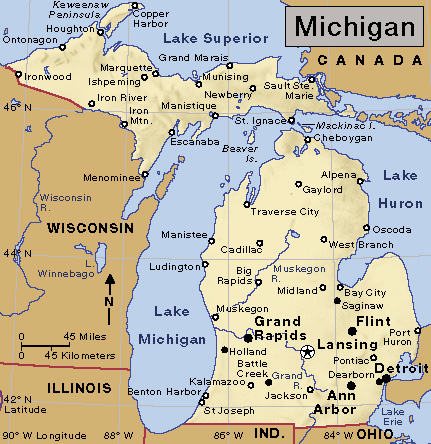Saginaw << SAG uh `naw` >> (pop. 44,202; met. area pop. 190,124) is a manufacturing city in eastern Michigan. The Saginaw River divides the city. The city lies about 85 miles (137 kilometers) northwest of Detroit and about 20 miles (32 kilometers) south of Saginaw Bay.

Saginaw’s manufacturers produce automotive parts, solar energy products, medical products, fabricated metal products, chemical-processing machinery, and graphite products. The city has many wholesale firms. It also is a regional medical center with a number of hospitals. Sugar beets are a major agricultural product in the Saginaw area, and sugar processing and shipping is a major industry. A number of grain elevators in Saginaw serve the farms, and the city also has one of the world’s largest bean elevators.
Large ships can use the Saginaw River, which connects the city with Saginaw Bay—an arm of Lake Huron. An airport, a freight railroad, trucking firms, and buses serve the city. Institutions of higher learning in the Saginaw area include Saginaw Valley State University.
A fur-trading post was established at what is now Saginaw in 1816. A settlement called Saginaw was founded on the west bank of the river about 1820, following the building of Fort Saginaw. A second settlement, called East Saginaw, began on the opposite bank in 1849. The two united as Saginaw in 1889. The area’s first lumber mill was erected in 1834. The area was a lumber center until its forests were cut down in the late 1890’s. Saginaw is the seat of Saginaw County and has a council-manager form of government.
